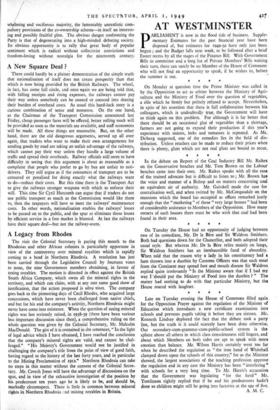A Legacy from Rhodes
The visit the Colonial Secretary is paying this month to the Rhodesias and other African colonies is particularly opportune in view of the controversy over mineral royalties which is rapidly coming to a head in Northern Rhodesia. A resolution has just been carried through the Legislative Council by fourteen votes to none, the nine Government members abstaining, in favour of taxing royalties. The motion is directed in effect against the British South Africa Company, which owns all the mineral rights in the territory, and which can claim, with at any rate some good show of justification, that the action proposed is ultra vire& The company goes back to the pioneering days of Cecil Rhodes, who acquired large concessions, which have never been challenged from native chiefs, and but for his and the company's activity, Northern Rhodesia might never have come into existence. When the question of taxing mineral rights was last seriously raised, in 1938-39 (there have been various less important discussion since then), a comprehensive ruling on the whole Question was given by the Colonial Secretary, Mr. Malcolm MacDonald. The gist of it is contained in tht sentences, " In the light of legal advice which I have obtained, I have reached the conclusion that the company's mineral rights are valid, and cannot be chal- lenged." " His Majesty's Government would not be justified in challenging the company's title from the point of view of good faith, having regard to the history of the last forty years, and in particular to the Mining Proclamation of 1912." Northern Rhodesia can take no steps in this matter without the consent of the Colonial Secre- tary. Mr. Creech Jones will have the advantage of discussions on the spot, and in view of the exhaustive investigation of the position by his predecessor ten years ago he is likely to be, and should be, markedly circumspect. There is little in common between mineral rights in Northern Rhodesia r nd mining royalties in Britain.






































 Previous page
Previous page